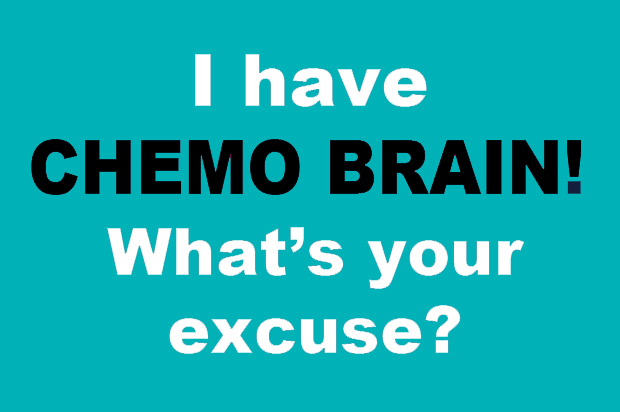Do you know about chemo brain? If you’ve ever had chemo you probably do (although you may not be able to find the words to describe it). In fact, you may not be able to find words for much of anything! Therein lies part of the problem.
What is Chemo Brain?
I’ve read all sorts of official medical-type descriptions of chemo brain, but, basically, it feels a lot like losing your ever-loving mind and being helpless to stop it! I remember trying to tell my oncologist something and being completely unable to string together a cohesive sentence. I jokingly told him, “Me no have words.”

Unfortunately, that joke wasn’t much of an exaggeration.
Here are a few of the common symptoms of chemo brain:
- Forgetfulness.
- Difficulty focussing on what you’re doing.
- An inability to remember something as basic as your own address or phone number.
- Difficulty with word retrieval.
- An absolute inability to multi-task.
- Taking an inordinate amount of time to complete a simple task.
Oh, sure, everyone experiences those things from time to time. This takes those normal experiences to the extreme. For me, chemo brain meant I could feel myself becoming dumber by the minute! I’m talking blithering idiot territory.

One of my sons did a great impersonation of me, in which he would start talking and simply trail off in mid sentence. Even I had to admit it was both funny and accurate.
Tips for Fighting Brain Fog
The good news is that chemo brain tends to improve in the months following treatment. In the meantime, there are a few things you can do to help you cope. None of them will end chemo brain, but you might feel as if you’ve flipped a switch and recaptured some lost IQ points.

You can try to:
- Get enough sleep even if “enough” is way more than you normally need.
- Put pen to paper. I wrote down things like my phone number and address if I knew that information would be needed during a phone call. There’s nothing like calling to schedule an appointment and forgetting who you are and where you live!
- Keep distractions to a minimum. You may have been able to spin a lot of plates in your pre-chemo days, but it’s time to admit you can’t do everything at once. Multi-tasking, schmulti-tasking! Who needs it?
- Take a walk. I have been a walker for years. There were days, during treatment, when I wasn’t able to log the miles I used to log, but I could still walk a bit. Some days that meant going a fraction of a mile at a whack, but I did that several times throughout the day.
- Eat a healthy diet that includes enough vegetables, protein, and healthy fats. Yes, there are days when you don’t feel like eating anything. Do the best you can.
- Drink lots of water. This was a challenge for me in the week following each treatment. Some people say water has a metallic taste to them. For me, the best way I can describe it is that water tasted like it wanted to kill me! Again, do the best you can on the bad days and drink a lot of water on your good days.
- One list I saw suggested learning a new language. Hahahaha! I couldn’t even remember the language I knew! Still, it is good to give yourself some mental challenges. I continued to write, even though I often needed help with word retrieval.
- Laugh at yourself. This is most likely temporary. Taking things too seriously will only make the fact that large portions of your brain are AWOL more stressful. I honestly binge watched every season of Curious George on Netflix to help with my logic skills. That little monkey helped me through some dark days!
It was rough going there for awhile, but, today, me have plenty of words! And me no afeared to use them!

